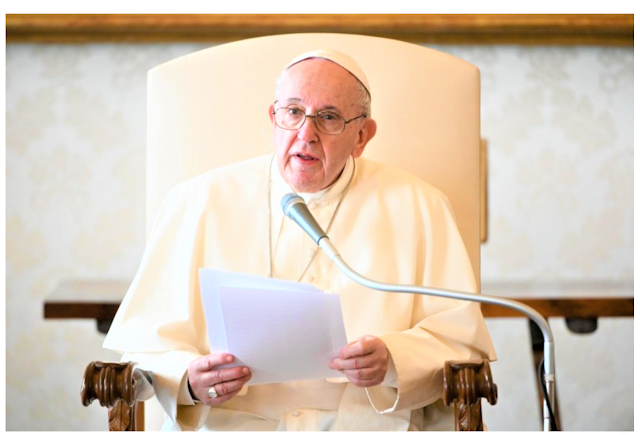Pope Francis Interview where he Explains Why Meeting with Russian Patriarch Kirill was Canceled by the Vatican

Pope Francis gave an interview to the daily newspaper La Nacion, of Argentina, which was published on the 21st of April, 2022. He told journalist Joaquin Morales Solá, that he is not planning to go to Kyiv or meet Patriarch Kirill in the near future. However, the Pope explained that there are continuous efforts to bring peace in Ukraine. He said, "I cannot tell you the details because they would cease to be diplomatic efforts. But the attempts will never stop."
In the interview, the Pope was asked about his visit to the Russian Embassy to the Holy See, alone, on Via della Conciliazione, on February 25th.
In the interview, the Pope was asked about his visit to the Russian Embassy to the Holy See, alone, on Via della Conciliazione, on February 25th.
"I went alone. I didn’t want anyone to accompany me. It was a personal responsibility of mine. It was a decision I made in a sleepless nigh thinking about Ukraine. It is clear to those who want to see things as they are that I was signaling to the government that it could put an end the war immediately. To be honest, I wanted to do something so that there would not be one more death in Ukraine. Not one more. I am willing to do everything."
In regards to a Ukraine visit, the Holy Father said, "I cannot do anything that puts higher objectives at risk, which are the end of the war, a truce or, at least, a humanitarian corridor. What good would it do for the Pope to go to Kyiv if the war continued the next day?"
"All war is anachronistic in this world and at this level of civilization."
"That is why I also publicly kissed the Ukrainian flag," he explains. "It was a gesture of solidarity with their deceasad, with their families, and with those who suffer emigration."
The Pope was also questioned as to why he does not name Putin or Russia when speaking about the war.
"A Pope," he says, "never names a head of state, much less a country, which is superior to its head of state."
Pope Francis was also asked about his relationship with Patriarch Kirill of the Russian Orthodox Patriarchate of Moscow.
The Pope said it was "very good," but explained, "I am sorry that the Vatican has had to cancel a second encounter with Patriarch Kirill, which we had scheduled for June in Jerusalem. But our diplomacy maintained that a meeting between us in this moment could lead to much confusion." The Pope says he always promoted interreligious dialogue.
"When I was Archbishop of Buenos Aires brought together in a fruitful dialogue Christians, Jews and Muslims," he said, "It was one of the initiatives that I am most proud of. It is the same policy that I promote in the Vatican. As you have heard from me many times, for me, agreement is superior to conflict."
In regards to a Ukraine visit, the Holy Father said, "I cannot do anything that puts higher objectives at risk, which are the end of the war, a truce or, at least, a humanitarian corridor. What good would it do for the Pope to go to Kyiv if the war continued the next day?"
"All war is anachronistic in this world and at this level of civilization."
"That is why I also publicly kissed the Ukrainian flag," he explains. "It was a gesture of solidarity with their deceasad, with their families, and with those who suffer emigration."
The Pope was also questioned as to why he does not name Putin or Russia when speaking about the war.
"A Pope," he says, "never names a head of state, much less a country, which is superior to its head of state."
Pope Francis was also asked about his relationship with Patriarch Kirill of the Russian Orthodox Patriarchate of Moscow.
The Pope said it was "very good," but explained, "I am sorry that the Vatican has had to cancel a second encounter with Patriarch Kirill, which we had scheduled for June in Jerusalem. But our diplomacy maintained that a meeting between us in this moment could lead to much confusion." The Pope says he always promoted interreligious dialogue.
"When I was Archbishop of Buenos Aires brought together in a fruitful dialogue Christians, Jews and Muslims," he said, "It was one of the initiatives that I am most proud of. It is the same policy that I promote in the Vatican. As you have heard from me many times, for me, agreement is superior to conflict."
Edited from Vatican News
Comments